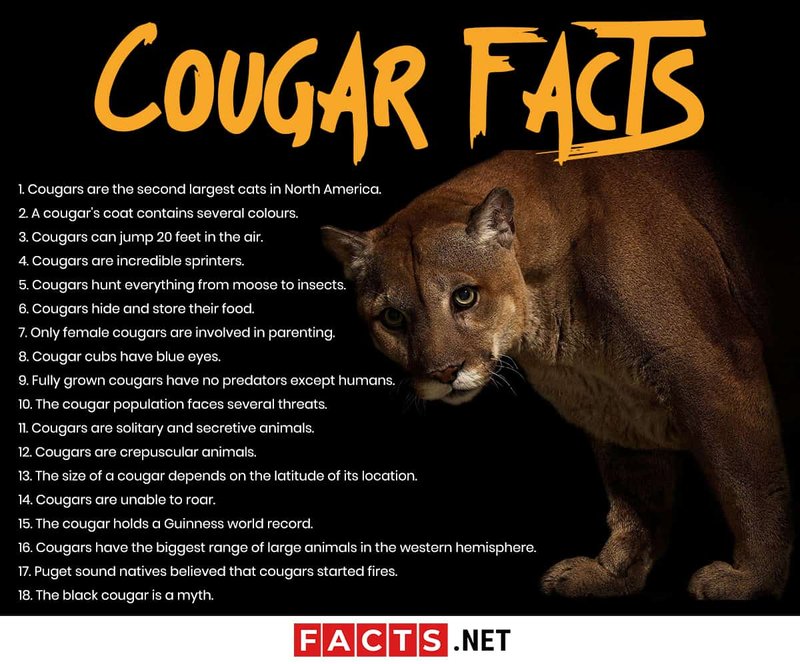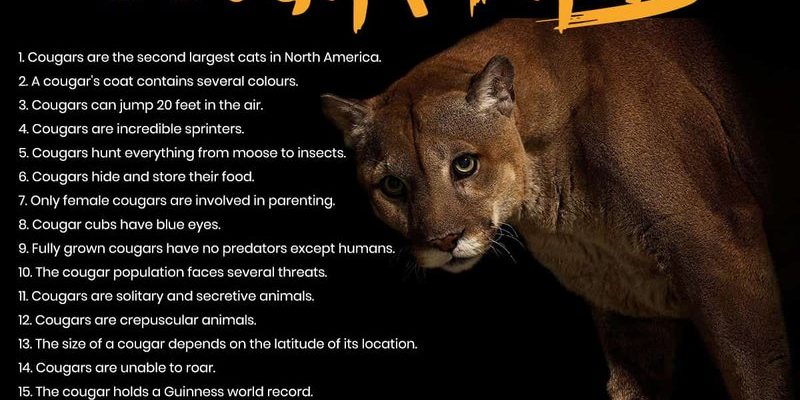
Imagine a game of chess, where each move counts and strategy is key. Cougars play their own version of this game every day, using their wit and instincts to survive. They have to outsmart their prey, navigate diverse terrains, and deal with competition from other wildlife. So, how smart are they really? Let’s dive into the fascinating world of cougars and their cognitive abilities.
What Are the Cognitive Abilities of Cougars?
Cougars are known for their impressive physical attributes, but their cognitive abilities are equally remarkable. They possess a range of skills that help them navigate their environment and hunt effectively. One of the key aspects of their intelligence is their problem-solving ability. For instance, when hunting, a cougar might assess the landscape, choose the best route to approach its prey, and even modify its tactics if the initial approach doesn’t work.
Another interesting aspect is their memory. Cougars have a strong spatial memory that allows them to remember the locations of food sources, water holes, and safe resting spots. This is crucial for their survival, especially in vast territories where they roam. Imagine trying to find your favorite coffee shop in a new city—your ability to remember the route is essential, just like a cougar’s memory helps it find its way around its habitat.
In addition to memory and problem-solving, cougars also demonstrate adaptability. They can change their hunting techniques based on the type of prey or environmental conditions. For example, they might rely on stealth in dense forests or use their speed in open areas. This flexibility shows that they can learn and adjust, proving that their intelligence is dynamic and not static.
Hunting Strategies: A Test of Intelligence
When it comes to hunting, cougars truly showcase their smarts. They are solitary hunters, which means they rely heavily on their abilities rather than teamwork. This solitary approach demands a high level of skill and intelligence. For instance, cougars often use a technique called “stalking,” where they quietly follow their prey, ensuring they remain unseen.
Have you ever watched a cat play with a toy? They often paw at it, pounce, and observe before making a move. Cougars exhibit similar behavior, using patience and observation before attacking. They’ll often choose high vantage points to spot their next meal, weighing the risks and rewards before making a calculated move. This type of strategic hunting is a clear indicator of their cognitive prowess.
Moreover, cougars are known to employ ambush tactics. They’ll often hide behind bushes or trees, waiting for the perfect moment to leap out and catch their prey by surprise. This technique requires not only physical agility but also keen judgment about timing and distance—both hallmarks of intelligence in the animal kingdom.
Social Behavior: Intelligence in Communication
While cougars are primarily solitary creatures, they do exhibit interesting social behaviors that indicate their cognitive abilities. They communicate through a variety of vocalizations, such as growls, hisses, and even screams. These sounds serve different purposes, from establishing territory to signaling distress. Think of it like a language of sorts—a way to express needs and emotions.
Cougars also engage in scent marking, which is another form of communication. They’ll scratch trees and leave their scent on various surfaces, signaling to other cougars about their presence. This practice not only helps in defining territory but also plays a role in finding mates. Their ability to understand and react to the signals of other cougars shows a level of social intelligence that’s vital for their survival.
During mating season, females may choose their mates based on the displays of strength or intelligence exhibited by males. This selection process indicates that cougars are not just about physical prowess; they’re also considering cognitive traits, which can influence the survival of their offspring.
Adaptation and Learning: The Smart Survivor
Adaptability is a critical aspect of a cougar’s intelligence. These big cats have learned to thrive in various environments, from mountains and forests to deserts. Their ability to adjust to different habitats shows not just survival skills but also a higher level of cognitive processing. You might think of it as a person moving to a new city and quickly learning to navigate the public transport system.
For instance, if food sources become scarce in a specific area, a cougar can change its territory and explore new regions in search of prey. This adaptability requires not just instinct but also memory and problem-solving skills. They have to remember landmarks and previous successful hunting grounds while also learning which new areas are less risky.
Moreover, cougars have been observed learning from their experiences. For example, if a young cougar fails to catch prey using a certain method, it may alter its technique in future attempts. This ability to learn from experiences is a significant indicator of intelligence, showing that they can analyze outcomes and change their behaviors accordingly.
Conservation Implications of Cougar Intelligence
Understanding the intelligence of cougars has important implications for their conservation. As humans encroach on their habitats, it’s vital to acknowledge their cognitive abilities to develop effective management strategies. If we appreciate how cougars adapt and think, we can create environments that help them thrive.
For example, ensuring that there are enough natural corridors for cougars to navigate between different terrains can help maintain their populations. These passages allow them to hunt, mate, and communicate without the added stress of human interference. Educating the public about the importance of these big cats and their smart behaviors can also lead to better support for conservation initiatives.
When people recognize cougars as intelligent beings, they might be more inclined to respect their habitats and understand their needs. This shift in perspective can greatly influence conservation efforts, ultimately leading to healthier ecosystems for both cougars and humans.
So, how smart is a cougar? Honestly, they’re quite a bit smarter than many people realize. Their combination of problem-solving skills, strategic hunting, and social interactions indicates a high level of intelligence that’s essential for their survival. Whether it’s through learning, adapting, or communicating, cougars showcase their cognitive abilities in a variety of fascinating ways.
Recognizing the intelligence of these big cats can enhance our appreciation for wildlife and inspire us to protect their habitats. After all, the more we understand these incredible creatures, the better equipped we are to ensure they thrive in the wild. Understanding their minds not only sheds light on their behavior but also helps us forge a deeper connection with the natural world around us.

